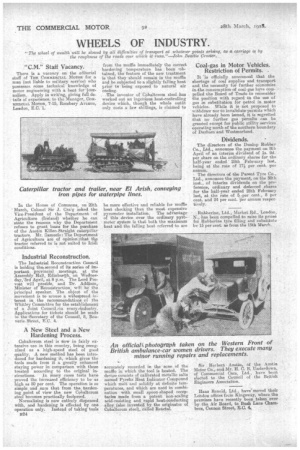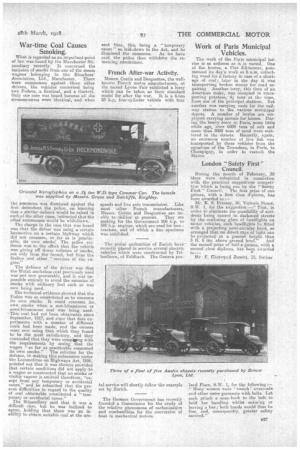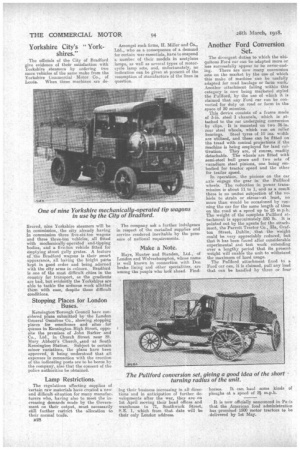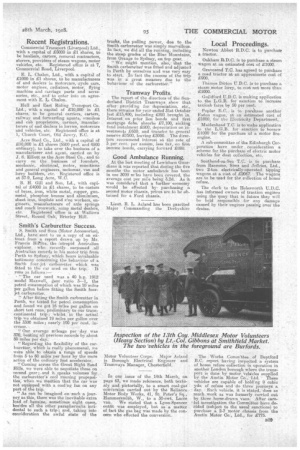WHEELS OF INDUSTRY.
Page 4

Page 5

Page 6

Page 7

If you've noticed an error in this article please click here to report it so we can fix it.
The wheel of wealth will be slowed by all difficulties of transport at whatever pokts arising, as a carriage is by
• the roughness of the roads over which it runs."—John Beattie Crozier.
"C.M." Staff Vacancy.
There is a vacancy on the editorial staff of THE COMMERCIAL MOTOR for a man (not liable to military serv'ee) who possesses some technical knowledge of motor engineering with a bent for-journalism. Apply in writhig, giving full details of experience, to the Manager, ColeMEROIAL Moron, 7-15, Rosebery Avenue, London, E.C. 1.
In the House of Commons, on 20th March, Colonel Sir J. Cra.'g asked the Vice-President of the Department of Agriculture (Ireland) whether he can state the reasons why the Department refuses to grant loans for the purehase of the Austin Killen-Straight caterpillar tractors. Mr. Samuels: The Department of Agriculture are of opinion ithat the tractor referred to is not suited to Irish conditions.
Industrial Reconstruction.
The Industrial Reconstruction Council is holding theesecond of its series of important provincial meetings, at the Assembly Hall, Edinburgh; on Wednesday,'5rd April, at 8 p.m. The Lord Provost will preside, and Dr. Addisee, Minister of Reconstruction, wilt be the Principal speaker. The object of the movement is to arouse a widespread interest in the recommendations of the Whitley Committee for the establishment of a Joint Councilein everysindustry. Applicatioes for tickets should be made to the 'Secretary of the Council, 8, Bouverie.Street, E.C. 4.
A New Steel and a New Hardening Process.
Cobaltcrom steel is now in fairly extensive use in this country, being recognized as a high-speed steel of good quality. A new method has been introduced for hardening it, which gives the tools made from it a greatly enhanced staying power in comparison with those treated according to the original in
structions. in many cases tests have proved the increased efficiency to be as high as 50 per cent. The operation is so simple and sure that from the hardening point of view the new Cobaltcrom
steel becomes practically foolproof. Normalizing is now entirely dispensed with, and hardening is effected by one operation only. Instead of taking tools 824 from the muffle immediately the correct hardening temperature has been •'obtained, the feature of the new treatment is that they should remain in the muffle and be subjected to a slightly falling heat prior to being exposed to natural air cooling.
The inventor of Cobaltcrom steel has worked out an ingenious heat-controlling device which, though the whole outfit only costs a few shillings, is claimed to
be more effective and reliable for muffle heat checking than the most expensive pyrometer installation. The advantage of this device over the ordinary pyrbe meter system is that both the maximum heat and the falling heat referrerleto are
accurately recorded in the zone of the muffle in which the tool is heated. The device consists of calibrated metallic salts named Pyreks Heat Indicator Compound which melt and solidify at, definite temperatures, and which are used in combination with small spoon-shaped receptacles made from a patent non-scaling acid-resisting and rapid heat-conducting alloy (also invented by the originator of Cohaltcrom steel), called Reactal.
Coal-gas in Motor Vehicles. Restriction of Permits. .
It is officially announced that the shortage of coal supplies and transport and the necessity for further economies in the consumption af coal-gas have compelled the Board of Trade to reconsider the position with regard to the use of gas in substitution for petrol in motor vehicles. While it is not proposed to withdraw nor to invalidate 7iermits which have already been issued, It is regretted that no further gas permits can be granted except for public utility services' operating north of the southern boundary , of Durham and Westmorland.
Dividends.
The directors of the Dunlop Rubber Co., Ltd., announce the payment on 8th April of an interim dividend of is. 9d. per share on the ordinary shares for the ball-year ended 28th February last, being at the rate of 17i per cent. per annum.
• The directors of the Parent Tyre Co., Ltd., announce the payment, on the 50th inst., of interim dividends on the preference, ordinary and deferred shares for the half-year ended 28th February last, at the rate of 5 per cent., 8 per cent. and 24 per cent. per annum respectively.
R,ubberine, Ltd., Market Rd., LondOn, N., has been compelled to raise its prices for Rubberine tyre filling and substitute by 15 per cent. as froM the 15th March.
Sir Herbert Austin, of the Austin Motor Co., and Mr. H. C. B. Underdown, of Commercial Cars, Ltd., have been elected to the Council of the British Engineers Association, Hans Renold, Ltd., have moved their London offices from Kingsway, where the premises have recently been taken rover. by the Air Board, to Bush Lane Cham bers, Cannon Street, E.C. 4. . _
War-time Coal Causes Smoking.
What is regarded as an important point of law was heard by the Manchester -Stipendiary recently. It concerned the emission of smoke from one of the steam wagons belonging to the Bleachere'
Association, Ltd., Manchester. There were summonses against , three other drivers, thG vehicles condensed being two Fodens, a Sentinel, and a Garrett. Only one case was heard because all the aircumstances were identical, and when
the strmmons was dismissed against the first defendant the. police, on learning that a similar defence would be raised iii each of the other cases intimated that the other summonses would be withdrawn.
The charge in the case. that Was heard was that the driver was using a certain locomotive on a certain highway which did not consume, so far as is practicable, its owm smoke. The police evis dence was to the effect that the vehicle was giving off dense volumes of smoke, not only from the funnel, but from the firebox and other " crevices of the engine."
The defence of the driver was that the Welsh smokeless coal previously used was not now procurable, and it. Wag impossible entirely to avoid the emission •of smoke with ordinary fuel such as was now being used.
The technical evidence showed that the Forlen was so constructed as to consume its own smoke. It could consume its. own smoke when a non-bituminous or semi-bituminous coal was being -used: 'This coal had not been obtainable since September, 1917, and since that date experiments with a number of different coals had been made, and the owners were now using that which they found to be the most satisfactory, and they contended that they were compng with the requirements by seeing that the wagon "so far as practicable consumed its own smoke." The solicitor for the defence, in making this submission under the Locomotives on Highways Act, 1896, pointed out that it was therein provided that certain conditions did not apply to a wagon so constructed that no smoke or visible vapour is emitted therefrom, "except from any temporary or accidental cause," and he submitted that the present difficulties in regard to the quality of coal obtainable constituted a " temporary or accidental cause."
The Stipendiary said that it was a difficult case, bat he was inclined to agree, holding that there was an inability to obtain suitable coal at the pre
sent time, this being a " temporary cause" as laid,down in the Act, and he dismissed the summons. As we have said, the police then withdrew the remaining summonses.
French After-war Activity.
Messrs. Cottin and Desgouttes, the wellknown French motor manufacturers, at the recent Lyons Fair exhibited a lorry which can be taken as their standard model for aftet the war. It is a 4-ton 23 iip. .four-cylinder vehicle with four speeds and live axle transmission. Like most other French manufacturers, Messrs. Coffin and Desgouttes are un
able to deliver at present. They are making for the Government 100 h.p. to 300 h.p. engines, which are used for loco.tractors, and of which a fine specimen
• Was.exhibited.
The postal authorities of Zurich have recently placed in service several electric vehicles which were constructed by Tribarlhorn, of Feldbach. The Geneva pos tal service will shortly follow the example set by Zurich. • The German Government has recently founded a Commission for the study of the relative phenomena, of carbonization and combustibles for the conversion of heat in mechanical motors.
Work of Paris Municipal Vehicles.
• The work of the Paris municipal lorries is as arduous as it, is varied. One of the lorries, a Fiat 3-5-tonner, commenced its day's work at 6 a.m, collecting wood for a factory in case of a shortage of coal ; later in the day it was transporting broken stones for road repairing. Another lorry, this time of an American make, was occupied in transporting potatoes, 44 tons at the time, from one of the principal stations. Yet another was carrying coals for the railway station to the various municipal depots. A number of lorries are employed carrying cereals for horses. During the heavy snow in Paris, some little while ago, over 6000 tons of salt and more than 3000 tons of sand were scattered in the 'streets. Recently, again, an enormous number of live fish was transported by these vehicles from the •
aquarium of the Trocadero, in Paris, to Champigny, in order to -restock the Marne..
London "Safety First" • Council.
During the month of February, 38 ideas were submitted in connection with the Practical suggestions competition 'Which is being run by the " Safety First " Councils The first prize of one inea, with a first class dploma,, has een awarded to :—
Mr. R. S. Prinsep, 56, Victoria Street, S.W. 1, for the suggestion:—' That, in order to eliminate the possibility of accidents being caused in darkened streets by the confusing glare of headlights on motor vehicles, such headlights be fitted with a projecting semi-circular hood, so arranged that no direct rays of light can be protected at a greater height than 3 ft. 6 ins.' above ground level." And the second-prize of half-a-guinea, with a second class diploma, has been awarded to :—
Me Clietnsyrd jessett. 15, Siither
land Place, S.W. 1, for ttse following:— " Many women wear trench' overcoats and other outer garments with belts. Let each attach a snap-hook to the belt to hold her handbag whilst entering or leaving a bus ; both hands would thus be free, and, consequently, greater safety' secured."
Yorkshire City's "Yorkshires." •
The officials of the City of Bradford give evidence of their satisfaction with Yorkshire steamers by ordering two 1110re• vehicles of the same make from the Yorkshire Commercial Motor Co., of Leeds. When these machines are de
livered, nine Yorkshire steamers will be in commission, the city already having in commission three five-six-ton wagons and three three-ton vehicles, all fitted with mechanically-operated end-tipping bodies, and a five-ton vehicle fitted for emptying street gully grates. A feature of the Bradford wagons is their smart appearance, all having the blight parts kept in good order and being adorned with the city arms in colours. Bradford is one of the moat difficult cities in the country for transport, as the gradients are bad, but evidently the Yorkshires are able to tackle the arduous work allotted them with ease, despite these difficult conditions.
Stopping Places for London Buses. •
KensingtonlBorough Council have considered plans submitted by the London General Omnibus Co., showing stopping places for omnibuses and sites for queues in Kensington High Street, opposite the premises of John Barker and Co., Ltd., in Church Street near St. Mary Abbott's Church, sand • at South Kensington Station. Subject to certain minor variations, the plans have been approved, it being understood that all i expenses n connection with the erection of the indicating posts are to be borne by the company, also that the consent of the police authorities be obtained.
Lamp Restrictions.
The regulations affecting supplies of -certain raw materials have created a new and difficult situation for many manufacs turers who, having also to meet the increasing demands made by the Government on their output, must necessarily still further restrict the allocation to their normal trade.
13
28. Amongst such firms, IL Miller and Co., Ltd., who as a consequence of a demand for certain war essentials, have to suspend
number of their models in acetylene lamps, as well as several types of motorcycle lamp sets, and, unfortunately, no indication can be given at present of the resumption of manufacture of the lines in question.
The company ask a further indulgence in respect of the curtailed supplies and service rendered inevitable by the pressure of national requirements.
Make a Note.
Hays, Hunter and Standen, Ltd., of London and Wolverhampton, whose name is well known in connection with Don brake lining arid other specialities. are among the people who look ahead. Find ing their business increasing in all directions and in anticipation of further developments after the war, they are on 1st .April moving their head offices and warehouse to 71, Southwark Street, S.E. 1, which from that date will be their only London address.
Another Ford Conversion Set.
The divergent dutiee to which the ubiquitous Ford car can be adapted more or lees successfully appear to be never-ending. There are now many conversion sets on the market by the use of which this make of machine can be usefully adapted for road haulage or farm works Another attachment falling within this category is now being marketed styled the Pullford, by the use of which it is claimed that any Ford car can be converted for duty on road or farm in the space of 30 minutes. This device consists of a frame made of 3-in. steel 1 channels, which is attached to the car undergoing conversion by clips. It is mounted on two 36-in. rear steel wheels, which run on roller bearings. Steel tyres of 10 ins, width are utilized, and these can be fitted on the tread with conical projections if the machine is being employed for land cul tivation. They are, of course, readily detachable. The wheels are fitted with semi-steel bull gears and two sets of vanadium steel pinions, one being embodied for tractor speed and the other for trailer speed. In operation, the pillions on the car axle engage the gear in the Pulliord wheels. The reduction in power transmission is about 11 to 1, and as a result there is no undue subjection of the vehicle to strain or stress—at least, no more than would be occasioned by running the car for the same length of time on the road at a speed up to 25 m.p.h. The weight of the complete Pullford attachment is approximately 850 lb. It is pointed out by the agents for the attachment, the Parrett Tractor Co., 33a, Grafton Street, Dublin, . that the weight could be .very appreciably reduced, but that it has been found after considerable experimental and test work extending over a lengthy, period 'that its present weight will enable the unit to withstand the maximum of hard usage.
The Pullford attachment fixed to a Ford car can, it is claimed, pull any load that can be handled by three or four
horses. It can haul some kinds a ploughs at a speed of 2t m.p.h.
It is now officially announced in Pal is that the American food administration has promised 1500 motor tractors to be delivered by 1st May.
Recent Registrations.
Commercial Transport (Liverpool) Ltd., with a capital of £5000 in .£1. shares, to be hauliers, carters, removal contractors, storers, providers of steam wagons, motor vehicles, etc. Registered office is at 7, Commercial Road, Liverpool.
E. L. Chalon, Ltd., with a capital of £1000 in £1 shares, to be manufacturers of and dealers ia motorcars, ,cycle cars, motor engines, radiators, motor, flying machine and carriage parts and accessories, etc., and" to enter into an agreement with E. L. Chalon.
Hull and East Riding Transport Co. Ltd., with a capital of £10,000 in £1 shares, to -be general carriers, carters, railway and forwarding agents, omnibus and cab proprietors, carmen, manufacturers of and dealers in lorries, motorcars and vehicles, etc. Registered office is at 1, Church Court, Old Jewry, E.G.
Acre Steel Co., Ltd., with a capital of £10,000 in £1 shares (5500 pref. and 4500 ordinary), to take over the business of a manufacturer and agent, e.arried on by J. 5, Elliott as the Acre Steel Co., and to carry on the business of founders, mechanic, electrical, motor, munitions and general engineers, motorcar: van and lorry builders' etc. Registered office is at 61-9, Long Acre, W.O.
B. H. Gill and Son, Ld., with capital of £4000 in £1 shares, to be casters of brass, iron, white metal, copper, gunmetal, phosphor bronze and aluminium, sheet inn, tinplate and zinc workers, engineers, manufacturers of axle springs and coach ironwork, scrap metal dealers, etc. Registered office is at Wallows Steeet, Round Oak, Brierley Hill.
Smith's Carburetter Success.
S. Smith and Sons (Motor Accessories), Ltd., have sent to us a copy of an extract from a report drawn, up by Mr. Francis Billtles, the intrepid Australian explorer, who recently surpassed all Australian records in his motor trip from Perth to Sydney, which bears invaluable testimony concerning the behaviour of a. Smith four-jet carburetter which was fitted to the car used on the trip. It runs as follows:— " The car used was a 40 h.p. 1912 model Maxwell, gear ratio 3-1, the petrol consumption of which was 10 miles per gallon before fitting the Smith fourjet carburetter.
"After fitting the Smith carburetter in Perth, we tested for petrol consumption and found we got 16 rri'les per gallon on short test runs, preliminary to our transcontinental trip ; whilst in the actual trip we obtained 19 miles per gallon over the 3300 miles; nearly 100 per cent, increase.
t` Our average irileage per day was 370, beating all previous records by about 50 miles per day. • • "Regarding the flexibility of the carburetter, which is really phenomenal, we were able to obtain a range of speeds from 5 to 60 miles per hoar by the mere act;den of the ordinary foot accelerator.
"Coming across the Great Bight Sand Hills, we were able to negotiate these on second gear ; . and it ,speaks volumes foe the carburettor's cool running propensities; when we "iteration that the car Was not equipped with .a cooling fan on any part of the trip.
" .A.s can be imagined on such a journey as this, there was the inevitable extra load of benzine, sometimes 'eight eases, hew ' des all the other paraphernalia incidental to such a trip; and, taking into consideration the awful state of the
tracks, the pulling power, due to the Smith carburetter was simply marvellous. In fact, we did all the running, including the steep grades of the Blue Mountains, from Orange to Sydney, on top gear. "We might mention, also that the, Smith carburettei? was fitted arid adjusted in Perth by ourselves and was very easy to start. In fact the success of thetrip was in a great measure due to the behaviour of the carburetter."
Tramway Profits.
The report of the directors of the Sunderland District Tramways show that after providing for depreciation, etc., there remains for year ended 31st October last £13,400, including £881 brought in. Interest_ On prior lien bonds and " first mortgage debs. absorbs £7,100, sinking fund instalment £500, depreciation on investmen6 £600, and transfer, to general reserve £2200, leaving £3000. The directors recommend interest at the rate of 3 per cent, per annum, less tax, on first. income bonds, carrying forward £898.
Good Ambulance Running.
At the last meeting of Lewisham Guardians it was reported that during the five months the motor aanbulanc;e has been in use 3099 milee have been covered, the average cost per mile being 3.2d. AS it was considered that a further 'economy would be effected by, purchasing a second motor 'chassis, prices 'are,to be obtained for a Ford chassis.
• • Lieut. It. L. Aeland has been gazetted Major Commanding the Derbyshire Motor Volunteer Corps. Major Acland is Borough Electrical Engineer and . Tramways Manager, Chesterfield. • In our issue of the 14th March, on page 63, we made reference, both textualy and pictorially, to a smart coal-gas' conversion carried out" by the RelianceMotor Body Works, 41, Sa. Peter's Sq., Hammersmith, W„ to a 30-cwt. Lacre van. We stated that a Lyon-Spencer outfit was employed, but as a matter offset the gas bag was made by the concern who effected the conversion.
Local Proceedings.
Newton Abbot• R.D.C: is to purchase a tractor.
Oakharn R.D.C. is to purchase a steam wagon at.an estimated Cost of £1000.
Gravesend T.C. has agreed to purchase a road tractor at an approximate cost of .£900. .
Thames Ditton U.D.C. is to purchase a steam .motor lorry, to cost not more than
Guildford U.D.C. is making application to the L.G.B. for sanction to increase taxieab fares by 50 per cent. . .
Poplar B.C. is to purelhase another Emden wagon, at Rte estimated cost of £1000, for the Electricity Department,
Maidenhead T.C. ito make application to the L.G.B. for sanction to borrow £1000 for the purchase of a motor fire. origins.
A sub-committee of the. Edinburgh Corporation have under . consideration a scheme for the purchase of electric motor vehicles for dust collection, etc.
Southend-on-Sea T.C. is to purchase from Ransome, Sims and Jeffries, Ltd., two 2-ton electrically-operated tipping wagons at a cost of £2067. The wagons are to he used for the collection of house refuse.
The clerk to the Ilolesworth U.D.C. has informed owners of traction engines using the 'quay, that in future they will be held responsible for any damage causes by their engines passing over the drains.
The . Works Corn in:ttee of Deptferd B.C. reliant-havine inspected a system of house refuse -collection in operation in another London borough where the trans-: port' is done by mofor, vehicles supplied by" the Austin Motor:Co: "-Ltd. These vehicles are capable of h'old'rig 9 cubic yds: of refuse and do threejourneys a day. Each. vehicle, it is stated, 'does as much work as was formerly carried out by three home-drawn vans. After care'fel investigation the Committee have de-. eided (subject to the usual sanctions) to purchase a 2-3 -motcir chassis, from the Austin Motor Co., Ltd., for £775. B20






















